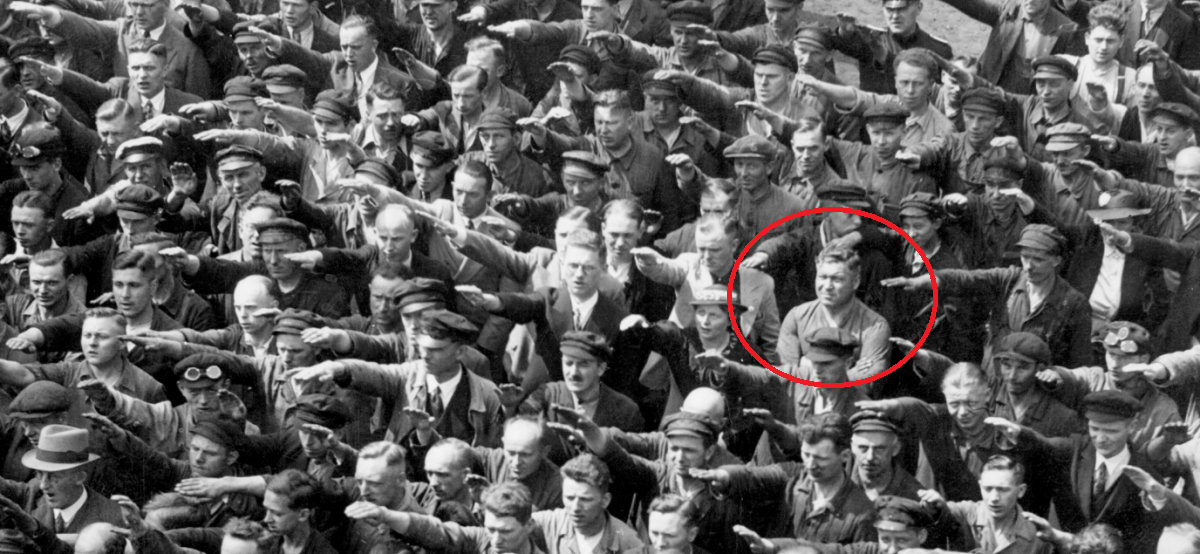The tragically powerful story behind the lone German who refused to give Hitler the Nazi salute

Your support helps us to tell the story
From reproductive rights to climate change to Big Tech, The Independent is on the ground when the story is developing. Whether it's investigating the financials of Elon Musk's pro-Trump PAC or producing our latest documentary, 'The A Word', which shines a light on the American women fighting for reproductive rights, we know how important it is to parse out the facts from the messaging.
At such a critical moment in US history, we need reporters on the ground. Your donation allows us to keep sending journalists to speak to both sides of the story.
The Independent is trusted by Americans across the entire political spectrum. And unlike many other quality news outlets, we choose not to lock Americans out of our reporting and analysis with paywalls. We believe quality journalism should be available to everyone, paid for by those who can afford it.
Your support makes all the difference.Adopted by the Nazi Party in the 1930s, Hitler's infamous "sieg heil" (meaning "hail victory") salute was mandatory for all German citizens as a demonstration of loyalty to the Führer, his party, and his nation.
August Landmesser, the lone German refusing to raise a stiff right arm amid Hitler's presence at a 1936 rally, had been a loyal Nazi.
Landmesser joined the Nazi Party in 1931 and began to work his way up the ranks of what would become the only legal political affiliation in the country.
Two years later, Landmesser fell madly in love with Irma Eckler, a Jewish woman, and proposed marriage to her in 1935.
After his engagement to a Jewish woman was discovered, Landmesser was expelled from the Nazi Party.
Landmesser and Eckler decided to file a marriage application in Hamburg, but the union was denied under the newly enacted Nuremberg Laws.
The couple welcomed their first daughter, Ingrid, in October 1935.
And then on June 13, 1936, Landmesser gave a crossed-arm stance during Hitler's christening of a new German navy vessel.
The act of defiance stands out amid the throng of Nazi salutes.
In 1937, fed up, Landmesser attempted to flee Nazi Germany to Denmark with his family. But he was detained at the border and charged with "dishonoring the race," or "racial infamy," under the Nuremberg Laws.
A year later, Landmesser was acquitted for a lack of evidence and was instructed to not have a relationship with Eckler.
Refusing to abandon his wife, Landmesser ignored Nazi wishes and was arrested again in 1938 and sentenced to nearly three years in a concentration camp.
He would never see the woman he loved or his child again.
The secret state police also arrested Eckler, who was several months pregnant with the couple's second daughter.
She gave birth to Irene in prison and was sent to an all-women's concentration camp soon after her delivery.
Eckler is believed to have been transferred to what the Nazi's called a "euthanasia center" in 1942, where she was murdered with 14,000 others.
After his prison sentence, Landmesser worked a few jobs before he was drafted into war in 1944.
A few months later, he was declared missing in action in Croatia.
Read more:
• This chart is easy to interpret: It says we're screwed
• How Uber became the world's most valuable startup
• These 4 things could trigger the next crisis in Europe
Read the original article on Business Insider UK. © 2016. Follow Business Insider UK on Twitter.
Join our commenting forum
Join thought-provoking conversations, follow other Independent readers and see their replies
Comments